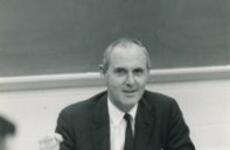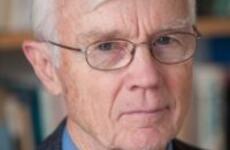IWER
IWER History
The MIT Institute for Work and Employment Research (IWER) traces its history back to the MIT Industrial Relations Section, which was established in 1937 and was renamed IWER years later. IWER faculty and students have a long history of taking their research directly into the world of public policy and private practice. In its early years, faculty members such as George Shultz, Charles Myers, and Douglas Brown contributed to the post-World War II studies of labor market policy and collective bargaining that helped to build what others came to call the “post-war social contract.” Douglas McGregor, who helped launch the MIT Industrial Relations Section and served as Executive Director in its early years, later went on to write the classic book The Human Side of Enterprise, which had a major impact on both management theory and management education.
Joseph Scanlon came to MIT from the Steelworkers’ Union in the late 1940s and developed what became known as the Scanlon Plan, the nation’s longstanding and most widely adopted productivity gainsharing program. Biannual conferences brought firms that had adopted the plan together with those considering it. The proceeds from these conferences continue to provide Scanlon fellowship and research support to IWER graduate students.
Phyllis A. Wallace
In the 1970s, economist Phyllis Ann Wallace, who dedicated much of her professional life to studying data on discrimination in the workplace, joined the IWER faculty and became the first woman to receive tenure at MIT Sloan. "She is a true hidden figure of the empirical literature on race in America,” James J. Heckman, a Nobel laureate who was influenced by Wallace, said in a recent article about Wallace's work and impact.
In the 1980s, Michael Piore and Charles Sabel wrote their classic book The Second Industrial Divide, which fostered a debate over how mass production might be replaced by flexible specialization and thereby help advanced economies become more competitive at higher standards of living. In addition, Thomas Kochan, Harry Katz, and Robert McKersie published The Transformation of American Industrial Relations, a book that challenged policy makers and labor and management practitioners to modernize their processes and relationships or face long-term decline in unionization, wages, and working conditions.
IWER faculty and students worked closely with the U.S. Department of Labor in hosting seminars with labor and management professionals to discuss how to best transform workplace practices to take the findings of these studies into account.
In the 1990s, attention turned to efforts to build and sustain “high-performance work systems.” Dissertations were written on this topic covering industries from office products to telecommunications, health care, steel, autos, and airlines. IWER faculty and students worked closely with the Alfred P. Sloan Foundation in sharing the results of this work with industry professionals. Paul Osterman, Thomas Kochan, Richard Locke, and Michael Piore built heavily on this work in the book Working in America: A Blueprint for the New Labor Market.
In the early years of the 21st century, Richard Locke led a large team of graduate students in studies of whether corporate codes of conduct were improving global labor standards. His 2013 book The Promise and Limits of Private Power brought this work together.
We continue to carry on this legacy of conducting rigorous scholarship that has important implications for practice and policy. In recent years, a number of IWER-affiliated scholars have written books focusing on how to improve the quality of jobs in America. Paul Osterman and Beth Shulman’s Good Jobs America focused on how to upgrade low-wage jobs to “make work better for everyone.” Zeynep Ton’s The Good Jobs Strategy explores how companies in the retail sector can manage their businesses in ways that produce both good profits and good jobs.
More recently, 2020 saw the publication of both the book Creating Good Jobs: An Industry-Based Strategy, edited by Paul Osterman, and Overload: How Good Jobs Went Bad and What We Can Do About It by Erin L. Kelly and Phyllis Moen. Creating Good Jobs examines the prospects for improving job quality in each of seven industries that employ many low-wage workers in the U.S., while Overload describes the results of a major work redesign initiative that Kelly and Moen helped design and deploy at a Fortune 500 company. That work redesign initiative resulted in improvements in employee job satisfaction as well as decreases in voluntary turnover and burnout.
Another major recent project has focused on worker voice in the United States. Launched in 2017, the worker voice project gathered new data about the degree to which employees can make themselves heard and have influence in the workplace. Led by MIT Sloan Professor Thomas A. Kochan, the research team also included MIT Sloan Professor Erin L. Kelly as well as Duanyi Yang (who received her doctorate from the IWER program in 2020 and is now an assistant professor at Cornell University ILR School) and William Kimball. The project involved a survey, conducted by NORC at the University of Chicago, of a representative sample of nearly 4000 U.S. adults of working age, asking a range of questions about how they feel about their influence in the workplace.
This research project resulted in a paper published in the journal ILR Review as well as a worker voice workshop held at MIT in November 2018 and a workshop on involving workers in technological change held in June 2019. The findings were also synthesized in a practical, accessible digest intended for practitioners and policymakers. In addition, findings from this research have been mentioned in major media outlets, including The New York Times, CNN.com, Vox.com, Fast Company, and The Boston Globe.
In addition, IWER faculty members Thomas Kochan and Paul Osterman were members of the MIT Task Force on the Work of the Future, and IWER faculty members contributed to the Task Force’s 2020 report, which included an emphasis on the need to improve economic prospects for U.S. workers without a college degree.
IWER faculty and students are committed to continuing to engage the world of work and employment as we find it and to put our research, teaching, and outreach to invent new ways to make work meaningful, rewarding, and productive for employees, employers, and society.
IWER Pioneers

-
Institute for Work and Employment Research IWER Pioneer: Douglas M. McGregor
-
Institute for Work and Employment Research Previous Luminary, An Appreciation: Charles A. Myers
-
Institute for Work and Employment Research A Tribute: Phyllis A. Wallace
-
Institute for Work and Employment Research When Scholars March: Robert B. McKersie




